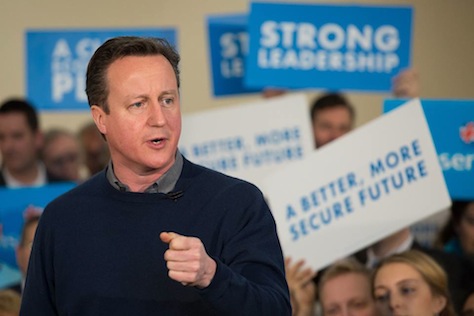It was certainly the kind of move German chancellor Angela Merkel would never have made.![]()
Surprising reporters and many members of his own party alike, British prime minister David Cameron earlier this week announced that he will not stand for a third term — that is, if he and the ruling Conservative Party win reelection on May 7.
What’s certain is that with 42 days to go until the vote, everyone in British politics today was talking about Cameron and the future of the Tories — and not about his opponents. Cameron not only indicated that he wouldn’t stand for a third term; he named three potential successors:
- Boris Johnson, the blond, floppy-haired mayor of London;
- Theresa May, Cameron’s home secretary and a tough eurosceptic; and
- George Osborne, the chancellor who’s taken as much heat as Cameron for the budget cuts of the past five years and who, insiders say, Cameron prefers as his successor.
It’s too soon to tell if the strategy will help Cameron and the Tories win what has become a very tight race with the center-left Labour Party. On the one hand, it’s a little presumptuous for a British prime minister to look past an election in just over five weeks’ time to proclaim that he won’t be running for reelection in five years’ time. Cameron’s shot at winning a second term is precarious enough as it is. Moreover, there’s a real question that he’s now made himself a lame duck for the second term, which promises to include a tough 2017 referendum on the country’s membership in the European Union if Cameron wins. What happens, by the way, if the Conservatives win a shaky minority government in May, lose a confidence vote in early 2016? Will Cameron resign when early elections follow? (Notwithstanding the new law purporting to establish fixed-term parliament.) Needless to say, it’s not the most intuitive step for a prime minister to launch a slow-motion leadership race so close to a general election.
On the other hand, it’s not out of character for Cameron, who’s never seemed to crave the premiership in the same way as former occupants of 10 Downing Street. It stands in contrast to Margaret Thatcher, who said he hoped to ‘go on and on’ after winning a third term and who finally left office after 11 years as a result of Tory regicide or to Labour prime minister Tony Blair, whose chancellor, Gordon Brown, pushed him out after a decade of intraparty sniping. Though the British media will spend this week talking about Cameron’s statement, the succession question will burn out by the time the real campaign begins, so you can expect relatively little off-the-record briefing about when Cameron will leave. His casual remarks end the speculation, for example, that he might resign after the 2017 referendum or in 2018. After all, if he hangs on until 2020 as he hopes, he will have served as the Conservative Party leader for fully 14 years — just as long as the Iron Lady herself.
Arguably, it frees Cameron to wage the most full-hearted campaign possible, because if he loses in five weeks’ time, his political career will end. No one doubted that would be the case (even without his remarks), but Cameron has now underlined that this is it. In a race where voters view Cameron as much more greatly suited to the office than Miliband, that could actually boost Cameron’s chances. If Cameron wins, he’ll be able to devote his full efforts to renegotiating British EU membership (and winning a referendum on EU membership) without worrying about the 2020 election. Continue reading Cameron ‘no-third-term’ bombshell launches Tory leadership intrigue
